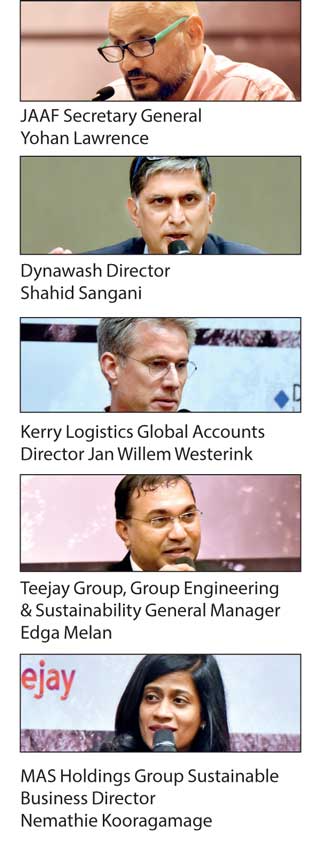Sunday Feb 22, 2026
Sunday Feb 22, 2026
Friday, 28 April 2023 00:00 - - {{hitsCtrl.values.hits}}

From left: Moderator Chathushka De Alwis, Kerry Logistics Global Accounts Director Jan Willem Westerink, MAS Holdings Group Sustainable Business Director Nemathie Kooragamage, Teejay Group, Group Engineering & Sustainability General Manager Edga Melan, Dynawash Director Shahid Sangani
 ‘Journey Towards Zero Waste’ was the topic of an informative panel discussion held at the 7th Responsible Fashion Summit organised by Colombo Fashion Week (CFW) last week in partnership with Joint Apparel Association Forum (JAAF) and Kerry Logistics Limited.
‘Journey Towards Zero Waste’ was the topic of an informative panel discussion held at the 7th Responsible Fashion Summit organised by Colombo Fashion Week (CFW) last week in partnership with Joint Apparel Association Forum (JAAF) and Kerry Logistics Limited.
JAAF Secretary General Yohan Lawrence highlighted identified the forum as a significant opportunity to showcase the Sri Lankan apparel industry’s designs, innovation, sustainability and circularity to the world. In his keynote address he stated: “At the core of the industry is its environmental footprint and the management of this is central to Sri Lanka apparel’s business model. This forum is a platform to highlight the industry’s journey beyond ‘Garments Without Guilt’, giving the world a glimpse of the industry’s initiatives in its ‘Journey Towards Zero Waste’.
CFW, the Responsible Fashion Movement Founder and Managing Director and Commonwealth Fashion Council in London Founding Member Ajai Vir Singh commended JAAF for understanding and supporting the vision propelling the summit. He emphasised that with supply chains not being present in the western hemisphere, platforms such as the Responsible Fashion Summit are crucial in showcasing how Sri Lanka leads the way in sourcing in South Asia.
The panellists included sustainability heads and logistic experts in the apparel industry, who highlighted the importance of collaboration and stakeholder engagement if the industry is to ramp up its sustainability efforts and make it accessible for all.
“As a country, we have the DNA of sustainability and have been progressive in our approach,” said MAS Holdings Group Sustainable Business Director Nemathie Kooragamage. “It is important however, to tackle the reduction of waste and consumption holistically. It’s not about reducing waste; it’s about making the fullest use of the raw material and how we make sure there is a circular economy. For that, a lot of work has to happen. The industry must invest in technological unlocks to ensure we can keep materials in use and continuously recycle. A circular economy is possible.”
With freight and logistics playing a critical role in transportation of goods and services, Kerry Logistics Global Accounts Director Jan Willem Westerink noted that access to renewable fuel would be essential to reduce carbon emissions and promote sustainability. “The entirety of the way we operate in shipping and logistics needs to change. It will be a long-term process, especially in sourcing renewable fuel where demand is high and supply is limited. Innovation and initiative will need to be taken to make the costs affordable as it will be a requirement ten years from now.”
Speaking on affordability, Dynawash Director Shahid Sangani highlighted the importance of reducing consumption from the design process. “Zero waste is a long journey, and the first step begins from the design process where waste reduction is mooted by rethinking and redesigning products which can be recycled with minimum resources.” Dynawash has pioneered the use of tea based dyes for apparel using what would normally be the waste product from the manufacture of iced tea, into a range of dyes which are now commercially available.
Teejay Group, Group Engineering & Sustainability General Manager Edga Melan noted that the perception of waste should be looked at through a different lens and used an example.
“Waste is not waste until you waste it” – this is our slogan. We perceive waste where we can bring wealth creation for our shareholders. At Teejay, for example, we have developed organic fertiliser with boiler ash in collaboration with the Agriculture Ministry. This is already being tested on certain crops and has yielded results. As a manufacturer, we have to change the way we think and seek alternative solutions to waste.”
Colombo Fashion Week, which is in its 20th year, has actively developed and followed a sustainable fashion paradigm and aims to drive progressive change in all aspects of the fashion industry in Sri Lanka.
– Pix by Ruwan Walpola